Due to the physical and mental demands required for them to constantly stay on top of their game, professional athletes have demanding nutrition standards that they need to follow.
Said Kathleen Stroia, Senior Vice President, Sports Sciences & Medicine & Transitions at the WTA (Women’s Tennis Association), “Nutrition, when applied properly, has the potential to optimise health, fuel growth, and development and subsequently enhance athletic performance. The provision of macro and micro nutrients combined with proper hydration, is responsible for fuelling the strength, endurance and power demands of sport. Nutrition works in partnership with athletic practice and conditioning to allow athletes to compete at their highest level.”
Sports dieticians manage their nutrition needs
In the WTA, athletes have sports dieticians to help them in their nutrition needs. Said Stroia, “The WTA has employed dieticians to participate in annual physicals and attend various tournaments throughout the year to provide individual dietary assessments.”
She added, “Medical advisers collaborate weekly throughout the year to effectively manage the athlete’s needs as the season progresses. In addition, the WTA dietician has prepared guidelines for tournament food services and reviews the food service programme of every tour name to ensure appropriate fuel is provided for the athletes.”
Diet varies according to training and competition requirements
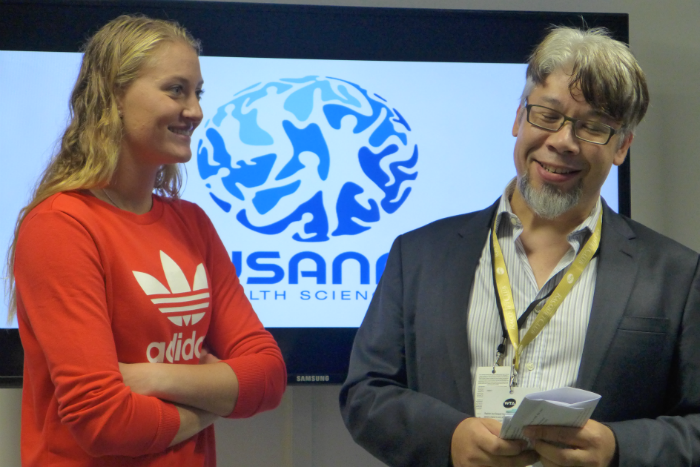
Kristina Mladenovic (left), a professional tennis player with the WTA, has to look after her competition and nutrition requirements.
The diet of a WTA player varies depending on their training and competition requirements as well as environmental demands, and must be specific to each individual.
Added Stroia, “While training, the diet will focus on ensuring optimal fuelling, hydration and recovery of the professional tennis player. The importance of the pre-event meal is to maximise fuel and fluid levels before a match, prevent either hunger or gastrointestinal distress and provide necessary fuel and a psychological boost during the game. Nutrients and fluids consumed during competition are to delay the onset of fatigue, prevent dehydration and create a foundation for optimal performance. The goal of recovery nutrition is to rehydrate, consume sufficient proteins for muscle repair and consume sufficient carbohydrates to replenish glycogen stores.”
Good recovery also helps to optimise training adaptation and the ability to perform at 100 per cent of the body’s potential. Says Stroia, “Recovery nutrition should be composed of 1g of carbohydrate per kg of body weight to replenish glycogen stores, 15-23g of proteins to repair muscle and under 8g of fat to slow digestion. Rehydration will require 1.5 litres of fluid per kg of sweat lost from the session as well as electrolytes from a sports drink or extra salt added to the food.”
Nutrition needs of WTA players
In general, Stroia added that there are some general guidelines for the nutrition needs of the WTA players and these include the following:
- Training – Three meals, with two to three snacks consumed during the day. One meal is designed with half the plate being carbohydrate rich foods, a quarter lean proteins and a quarter colourful vegetables with fats, flavours and fluids to provide the final structure of the meal.
- Pre-competition – Carbohydrate rich foods for fuel, low in fat to aid digestion and adequate in fluids to optimise hydration
- Competition – 16 ounces (473ml) of sport drink and 16 ounces of water every hour, 30 grams of gels, chew or sports bar with one litre of water every hour
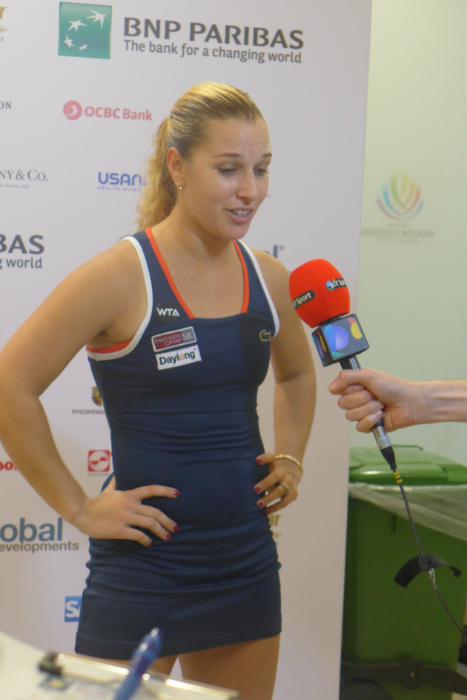
Professional athletes must be able to handle the media pressure, as well as being able to train and play well.
Good nutrition programme is not static
A good nutrition programme however, is not static, but changes depending on the athlete’s health and the tournament schedule ahead, according to Stroia.
She then cited the main challenges of maintaining a good training programme, being as follows:
- The training programme has to be adopted 80 per cent of the year and adapted accordingly to daily or seasonal changes and demands
- Year-long competition during the summer months places greater emphasis on the importance of proper hydration
- Travelling, which consist of time zone changes, as well as changes in climate and culture, can affect a person’s health and nutritional status
- Many tennis players may have inadequate time to ensure that their body recovers fully, so the nutrition plan should be modified to suit their physical and mental status at the time
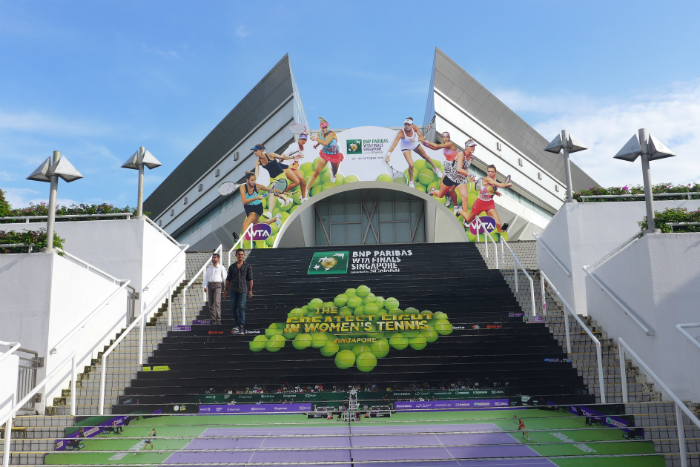
Travelling to matches and tournaments around the world, such as to Singapore, forms an essential component of a career in professional athletics.
Such demanding nutrition programmes are important regardless of the sport that the athlete is pursuing, Stroia adds. She says, “Whether you are a tennis player, marathon runner or Olympic weight lifter, it is important to use a sport dietician’s expertise to guide your sport specific diet to fuel your training and competition needs.”
Physical, emotional and mental demands of professional athletes are much higher than “weekend warriors”
So as such, the demands of having a good and sound nutrition programme for professional athletes, is much more critical – as compared to recreational athletes or “weekend warriors” who do not do sport for a living.
Said Stroia, “The physical, emotional and mental demands between a recreational athlete and a professional one differ greatly. Professional athletics is a highly physical, emotional and mentally intensive job. It requires longer hours than the standard office 9-5 job. It is where the employees, that is the athletes, must learn to effectively manage mental and emotional stress resulting from a 10-month competition season, global travel and media and sponsorship pressure, to name a few.”

Professional athletes may be rewarded with glamorous silverware when they win, but the path to victory holds a lot of challenges.
She continued “Professional athletics have a job that does not come with allotted sick days, therefore proper nutrition is essential to maintain optimum health throughout training, travel and competition. The amount of time invested in training and competition as well as the level of intensity during the training and competition will greatly exceed that of the recreational athlete. A professional tennis player’s training will include aerobic conditioning, strength training, sport specific agility and plyometric drills and on-court practice. This rigorous training schedule can exceed more than four hours in a single day. It is also common for athletes to practise twice daily. A single tennis match holds the potential to last three hours. If the athlete is competing in singles and doubles, match competition could reach more than six hours in a day.”

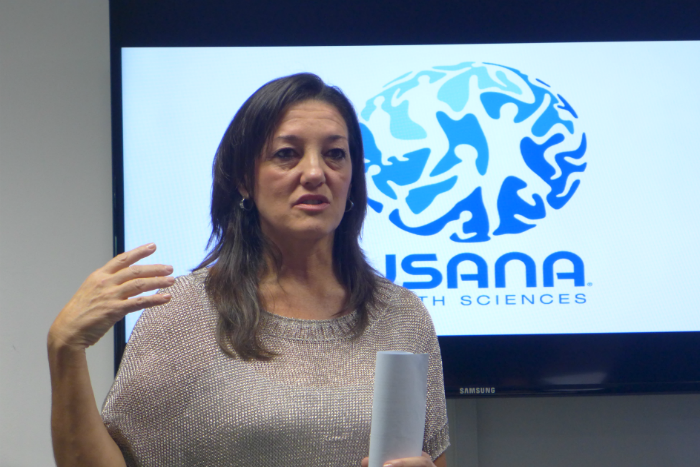
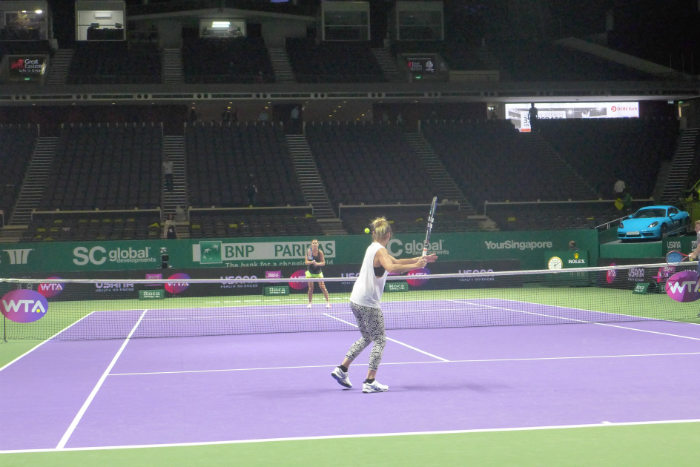
Leave a Comment